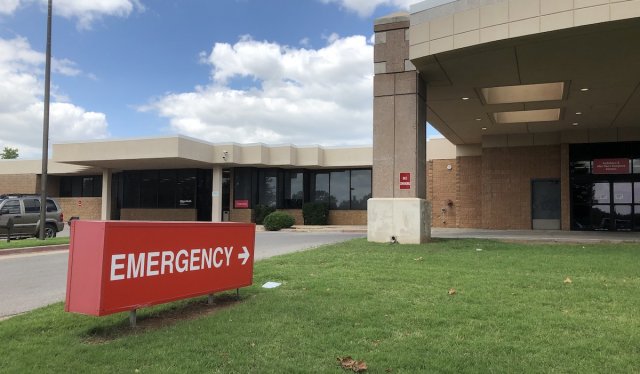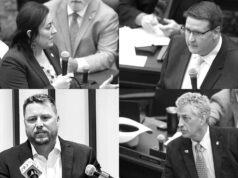

Starting Wednesday, July 31, advocates of the proposed ballot measure to expand Medicaid coverage in Oklahoma will have 90 days to collect nearly 178,000 signatures to qualify SQ 802 for a vote of the people.
That 90-day window will close Oct. 28, with the Oklahoma Secretary of State website noting that no signatures from registered voters will be accepted past 5 p.m. that Monday.
“We’re really excited to get started,” said Amber England, spokeswoman for the Oklahomans Decide Health Care campaign. “Since we launched the campaign in mid-June and with the Supreme Court decision, we have had tons of people across the state reaching out and wanting to volunteer on the campaign. That’s an indication of how much Oklahomans want to decide this issue.”
England said numerous people have already contacted the pro-SQ 802 campaign about volunteering, something she said will lead to a robust signature collection effort in every corner of the state.
“You’re going to get an opportunity to participate in this campaign because, honestly, this is a campaign for Oklahomans and by Oklahomans,” England said.
She said anyone interested in helping collect signatures for the constitutional amendment can text the word “Medicaid” to 474747 or sign up on the organization’s website. England said organizers will be aiming to collect more than the required 177,958 signatures.
“We will turn in more than that. It’s too important of an issue to leave to any technicality. Oklahoma sets a pretty high bar,” she said. “We have to collect 178,000 signatures, and we have 90 days to do it. So we don’t want to lose any days of that window.”
SQ 802 opposition already exists
As England’s group spends the next week fleshing out its campaign infrastructure, Jonathan Small, president of the Oklahoma Council of Public Affairs, will also be talking to people about Medicaid. His group, however, opposes SQ 802.
“Regardless of the outcome of the signatures, we believe that when Oklahomans ultimately vote on the issue, they will see that it is unwise like the Legislature has continued to see that time after time after time that they’ve looked at it,” Small said.
Some political insiders have questioned whether an active opposition campaign might be launched during the signature-gathering process, but Small said if such an effort materializes he won’t be leading it.
“We’ll continue to educate Oklahomans about the dangers of Medicaid expansion like we have done since 2011, but OCPA is not going to be involved in any way trying to prevent the collection of signatures,” Small said.
England said she and her colleagues cannot control what their opponents might do.
“We can only run the campaign we can run,” she said. “If there is a counter campaign, we look forward to laying out the facts of why this is important.”
England said expanding Medicaid coverage to low-income, working adults will ensure the return of Oklahoma tax dollars from Washington. She also said it will allow about 200,000 people to access health care more easily, and she said it will support rural hospitals, many of which are struggling financially.
“For people in rural Oklahoma, when those hospitals do close, they have to drive further. Oftentimes that is a matter of life or death,” she said. “We think we are on the right side of this issue.”
Legislature working on issue as well
Sen. Greg McCortney (R-Ada) has a different opinion than either England or Small. McCortney proposed an expansion of Insure Oklahoma’s public-private partnership to cover roughly the same low-income population during the 2019 legislative session, but his bill stalled.
“I am absolutely opposed to the ballot measure. I think the people with the ballot measure are going about this the wrong way, but I am also opposed to doing nothing,” McCortney said. “I think the right answer falls somewhere between those two, and I hope we can get the right answer done.”
By “we,” McCortney means the Legislature and Gov. Kevin Stitt’s office, which has told media that it will be studying the issue ahead of the 2020 legislative session. Legislative leaders have said roughly the same thing, with the House rejecting almost all of its health care-related interim studies.
“The House and Senate are creating a joint healthcare working group (…) and those topics will discussed during that process,” House Speaker Charles McCall’s press secretary, Jason Sutton, wrote in an email Friday.
McCortney served on the medical marijuana working group last interim and said he does not know exactly how this year’s health care working group will look when announced.
“I personally am hoping to see that this task force not just be the House and the Senate but also include some people with the executive branch so we can all move forward in unison,” McCortney said. “That is my hope. Now whether that happens is another question.”
He added that rumors about a potential fall special session to pass some sort of Medicaid expansion plan could come to fruition if a compromise can be struck.
“On the question of special session, where I am at this point is I want us to come up with the right plan, and then as soon as we have that I think we should move,” McCortney said. “If we can have that done by the middle of October, then I would be in favor of a special session. But if we don’t get that done until January, then I think it would be a waste of taxpayer dollars to come in two weeks early.
“So it really depends how quickly we can come up with a really good and well-thought-through plan, and that’s a pretty complex deal.”




















